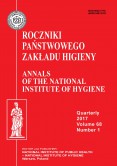Rocz Panstw Zakl Hig 1997, 48(4): 399-408
Ocena przydatności preparatów zawierających witaminy i/lub składniki mineralne do suplementacji racji pokarmowej
[Evaluation of the usefulness of vitamin/mineral preparations as dietary supplements]
ABSTRACT
The purpose of this work was to evaluate the vitamin/mineral preparations available on Polish market in 1995 in relation to their usefulness as dietary supplements. On the basic of the information in compendia, scientific papers, booklets, leaflets etc. the catalog of products containing vitamins and/or minerals was prepared. Complete data on composition, designation and other descriptors of 274 products were included. For further 28 preparations no full data were avaible. More than 53% of preparations were produced in Poland. Out of 274 preparations, 50% contained a single nutrient, while 20,1% contained 2-5 nutrients, 14,6% - from 6 to 10 nutrients, 13,1% - from 11 to 20 and only 2% - from 21 to 30 nutrients. Most of the products were intended for adults (165 preparations), adolescents (154 preparations) and children (132 preparations). Only 16 products were designed for pregnant and lactating women. Some of the preparations were intended for more than one population group with different dosage recommended by the producer. The amounts of nutrients in a single unit (pill, tablet etc.) of each product as well as percentage of recommended daily intake were estimated. Generally, these amounts were higher in products containing single nutrient than in multivitamin/mineral preparations. Out of 274 products included into the catalog, 132 met criteria established for dietary supplements in Poland (i.e. the amount of nutrients in supplements should not exceed 150% RDA). Among them in 25 preparations the amounts of nutrients in a unit of product were in agreement with a definition of supplements but daily doses recommended by the producers were much higher than 150% of RDA. For 33 products the amounts of nutrients in single units were very low, therefore to obtain a dose significant for dietary supplementation, one should take several units per day, usually the maximal dose recommended by producer. For 74 preparations the amounts of nutrients in single units as well as in daily doses recommended by the producer met criteria for supplements. Lack of complete and clear information on the label of vitamin/mineral preparations as well as lack of data on percentage of RDA covered by nutrients in the unit of product are the most important difficulties in choosing for dietary supplementation. The knowledge of composition of preparations containing various nutrients is necessary for nutritionist who want to assess the intake and nutritional status of some individuals as well as for their counselling work.
Downloads: 2757


